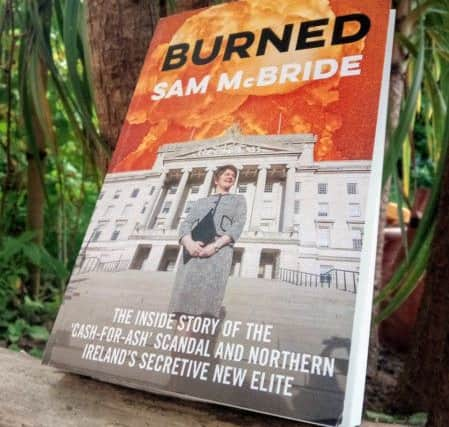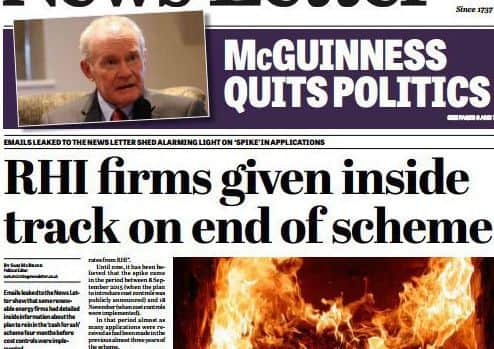DUP department used public cash in threat to injunct News Letter – over its own leak


On the afternoon of Thursday, January 19 2017, I was late arriving in the newsroom.
Writing about RHI had gone late into the previous night and that morning there had been another Stormont committee hearing.
Advertisement
Hide AdAdvertisement
Hide AdOn my desk was a large brown envelope, inside which were printouts of several emails. The communication, which was addressed to me by hand and delivered by Royal Mail, was anonymous. Its contents were extraordinary.


After skimming through the emails, I walked a few feet to the deputy editor’s office and told him that we had a huge story that had to run the following day. The emails showed that some renewable energy firms had been given detailed inside information about the plan to rein in cash for ash four months before the subsidy was cut – and that the information had come from the two officials running the scheme: Stuart Wightman and Seamus Hughes.
It added a new layer of complexity to the story. Aside from Jonathan Bell’s allegations of political skulduggery in delaying closure of RHI, here was firm proof that civil servants had been alerting the industry to the looming changes – and evidence that those firms immediately acted to pile into the scheme.
After quickly establishing that the emails were genuine, I asked the Department for the Economy for a comment and the story ran on the News Letter’s front page the following morning under the headline ‘RHI firms given inside track on end of scheme’.
Advertisement
Hide AdAdvertisement
Hide AdAlthough I had no clue as to where the emails had originated, it struck me that they were uniquely helpful to the DUP, diverting focus from a party which for five weeks had been unable to shift the spotlight from itself.


But whoever was helped by the information was not my concern.
The story had been turned around rapidly – within about six hours from the emails arriving on my desk to being on the front page – partly due to an expectation that they may have been sent to other media outlets.
In order to act so quickly, we had not published the names of any of those involved in the correspondence. There was insufficient time to give them a reasonable period of time in which to respond.
Advertisement
Hide AdAdvertisement
Hide AdBut the following morning I went back to the department with a series of questions for Wightman and Hughes, informing them that we would be naming them. Meanwhile, I set about trying to track down the various industry individuals involved in the exchanges – Paula Keelagher at pellet manufacturer Balcas (who replied through a PR firm), Fergal Hegarty at Alternative Heat (who never responded) and others, one of whom had worked for a company no longer operating in Northern Ireland.
The department’s immediate response was to warn that it may go to the High Court to seek an emergency injunction preventing publication of the names – an exceptionally rare move, particularly for a government department.
It then said that its most senior civil servant, Andrew McCormick, wanted to brief me in person, but that was cancelled after McCormick’s minister, Simon Hamilton, said he was unhappy with it.
Over several days, the department argued vigorously against the officials being named – something it said would undermine their right to a fair disciplinary process.
Advertisement
Hide AdAdvertisement
Hide AdThere was one difficulty in advancing that argument. The day before the brown envelope arrived, McCormick had named – based on hearsay – DUP special advisor (spad) Andrew Crawford as the individual who he had been told delayed cost controls in 2015.
Having been prepared to name a spad based on uncorroborated second-hand accounts, the civil service was now threatening to use public money to block the naming of civil servants – not based on hearsay, but based on documentary evidence that they had contributed to the spike.
The only way in which the emergence of the names could be prejudicial to the officials’ right to a fair disciplinary hearing would be if the department was open to being influenced by the News Letter’s coverage, something which in itself would be alarming.
By the following Wednesday, having taken legal advice and given everyone in the emails ample opportunity to explain their position, the News Letter told the department that we would be publishing the names the following morning.
Advertisement
Hide AdAdvertisement
Hide AdAt about 7pm that night I was on my way home from the office, stuck in heavy traffic, when the department’s senior press officer phoned to say that McCormick wanted to speak to me. ‘I know you are probably going to publish now, but he wants to make a final appeal not to name them,’ she said.
Some minutes later, on speakerphone as I drove home along Belfast’s Ormeau Road, he appealed for Wightman and Hughes not to be named. Although he made a firm appeal not to name the officials, it was along strikingly different lines to those advanced by the department in the official statements and made clear that the contact between officials and the industry had been unknown to him until very recently.
The following morning, the News Letter’s front page named the officials, making clear that we were not alleging corruption – or even necessarily wrongdoing of any sort – by Wightman or Hughes.
The minister, Hamilton, had approved the department’s response to the News Letter, which had argued for the officials not to be named, something it said would cause an ‘irreversible ... interference with their rights to privacy’.
Advertisement
Hide AdAdvertisement
Hide AdAnd his department had spent public money on legal advice around seeking an injunction against the newspaper.
What neither McCormick nor I understood at that point was that Hamilton himself had authorised his spad, John Robinson, to leak the emails.
Many weeks earlier, in December 2016, Crawford had been sent the emails by David Robinson – the major boiler installer who had installed Crawford’s brother’s boilers. Then, the day after Bell’s explosive interview – which named Crawford as a spad who allegedly delayed cost controls – Crawford forwarded the emails to John Robinson.
Robinson, who had been the DUP’s chief spin doctor before becoming a spad, had initially made no mention to the public inquiry of his role in leaking the emails.
Advertisement
Hide AdAdvertisement
Hide AdBoth in writing and then when appearing before the inquiry, he was asked if there was any other relevant information and he did not mention his role.
But after Hamilton admitted to the situation, Robinson told the inquiry that there was a desire to use the emails to take the focus off the DUP.
On December 23, Arlene Foster’s senior spad Richard Bullick asked Robinson why he had not yet sent the emails to the media. Bullick volunteered to bring envelopes to Robinson to facilitate the leak.
Robinson said he ‘wasn’t convinced’ that they should be leaked, and ‘as a means of delaying this course of action further, I did not print the emails’. He then sent the emails anonymously to McCormick.
Advertisement
Hide AdAdvertisement
Hide AdBut, despite being paid a spad salary of about £85,000 a year, he did not pay for sufficient postage, meaning that the envelope did not get to him until January 5. McCormick, unaware of the source, informed Robinson and Hamilton of the troubling new information.
But, having done so, Robinson then did not follow through on sending them to journalists as Bullick had instructed. Robinson claimed that the emails ‘were almost forgotten about’ – remarkable, given how desperate the DUP was in this period for anything which would distract from its role in the scandal.
Bullick recalled waiting over Christmas for the story to appear, and by early January he was surprised at the lack of media coverage. He said that it was only during the inquiry that it became clear to him that Robinson had not sent the material to the media until far later.
So why had he delayed?
His reasons may have been far more about protecting himself than protecting the DUP – or even Crawford.
Advertisement
Hide AdAdvertisement
Hide AdTwo days before the emails arrived with me and with the BBC, the Press Association had outed Robinson’s father-in-law as an RHI beneficiary.
There was no suggestion that there was anything improper in this, but it was still front page news for two reasons. First, Robinson was the key advisor in the department seeking to cut the RHI bill – yet he had a conflict of interest which he had not declared to the department.
After the revelation, he accepted that and recused himself from any role in RHI, the key issue with which the department was grappling – but still retained his full salary.
The second problem for Robinson was that the day before his father-in-law’s claim was revealed he had faced an accusation from Bell that he had an inappropriate role in RHI.
Advertisement
Hide AdAdvertisement
Hide AdSpeaking under Assembly privilege, Bell, who by now had been suspended by the DUP, said he had been told that he would not be allowed to rein in RHI because of Robinson and his brother-in-law Timothy Johnston’s ‘extensive interests in the poultry industry’.
The DUP branded that ‘outrageous, untrue and unfounded’, adding that ‘John Robinson has no personal interest in the poultry industry. His family home farm have chicken houses but are not part of the RHI scheme and never have been recipients or applicants’.
DUP members who had defended Robinson on the basis of what was – at best – a misleading statement were livid when they read about his father-in-law’s status as an RHI beneficiary, and he was under acute internal pressure.
In that context, having decided not to leak the emails to the media when it suited the party or Crawford, he now sent them to the media at the point where he was in peril.
Advertisement
Hide AdAdvertisement
Hide AdThere may have been another reason for his timing. The day before the envelope arrived on my desk, McCormick had alluded to the emails during a meeting of the Public Accounts Committee. Robinson might have hoped that the mandarin would say more about the emails in public, but McCormick was circumspect and there was little coverage of what he had said on the issue.
Several weeks later, a second anonymous brown envelope containing printouts of emails arrived on my desk. This time, the emails showed how the Ulster Farmers’ Union (UFU) had lobbied to delay cost controls.
Remarkably, given how the emails obviously shifted the focus from the DUP to the UFU, it had been the UFU’s chief executive, Wesley Aston, who had forwarded the emails to Crawford while the DUP was under intense pressure at the start of January 2017.
Crawford had done favours for the UFU in government, and the UFU could generally rely on him to argue farmers’ case within Stormont.
Advertisement
Hide AdAdvertisement
Hide AdRobinson and Hamilton had also – almost certainly knowingly – played a part in shifting the focus from themselves to farmers. Journalists and others had made multiple Freedom of Information (FoI) requests for RHI material.
The DUP, a party which routinely flouted FoI legislation, simply ignored many of the requests, which were never answered until Hamilton left office.
But one of my FoI requests was answered. It showed that the UFU had been lobbying to delay cost controls and also showed that civil servants had shown the organisation how lucrative RHI was for poultry farmers.
The DUP now seemed willing to even push its friends under in an attempt to deflect blame for what had happened. But even that ruthless attempt to shift the focus elsewhere would be overwhelmed by what was coming.